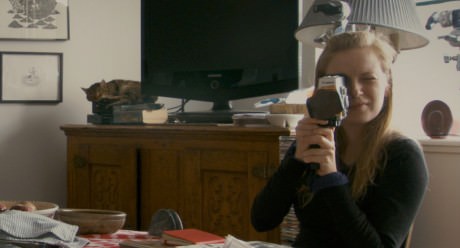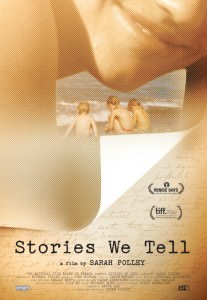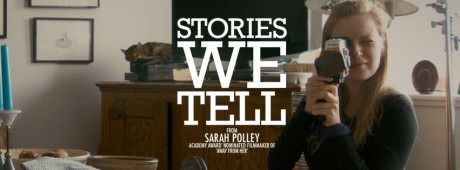Desperately Seeking Stories . . .
Every family has a story.
When you are in the midst of an account, it isn’t really a story at all. Only afterwards, does it become a story when you are telling it to yourself or recalling it for others.
Stories We Tell, the new thought-provoking memoir shot over a five-year period by Canadian actor/director Sarah Polley, is the filmmaker’s inner quest and collaged search to find out about her mother’s life and how she processes the collected memories about whom her beloved mother really was. Her discovery is a roller coaster of truth, stranger than fiction.

In 1990 shortly after Sarah’s eleventh birthday, her mother Diane (who was also an actress) died tragically from cancer.
The voiceover narration that opens the film is an introduction to Polley’s interview “interrogation” of her father and other family members as they look back on decades of events. This refreshingly candid and clever cinematic unfolding tells the history and story of Diane from the beginning until now as if it were a medley. The film is a eulogy of sort, and is told from the points of view of everyone involved.
Titillating in the curated edited details, there is little notice of self consciousness or flattering self indulgence. In her turbulent quest, Polley shows that she is as fascinated in uncovering the differences in the varying personal accounts as she is to discovering the real “truth.” Can the truth ever be known? Ultimately that’s the revelatory point Polley makes with ‘Stories We Tell’.
This is a film about a film, and with it Sarah Polley has crafted an intimate and absorbing masterpiece you won’t soon forget. It’s early in the season, but it’s worthy of an Academy Award nomination.
Do we ever really know someone?
Diane is present throughout the film. She tells her story through family photos, home movies, reenactments, and Super 8 archival footage. Appearing in fragments, our views of her shift and adjust as new information is continually revealed.
Polley quickly learns from many that her mother was a woman of secrets artfully hidden behind the razzle dazzle of her charm and wit. The vagary of truth, the unreliability of memory, and Polley trying to fit together who her mother and father were together is the heart and soul of ‘Stories We Tell.’
What is edited in our memory and what is safeguarded?
At some point, most of us come to realize the past is remembered falsely. Our revisionist minds work to make events better through enhancement, or we alter details by adding/subtracting to make them more interesting or dramatize to make them worst. Family arguments often come down to who owns the narrative or which version is decided as true. We look to others to confirm, and “agree” to our perceived version of the truth. Even though Stories is a personal tale, it is the commonality to the reaction to memory truths that makes this documentary so touching and accessible.
Within the varied mix of family mythology and mystique, Stories We Tell explores the concept of memory and time. What is enthralling is how the reminiscence and memory of Diane’s death has had a life changing impact in how it is refracted in so many different ways, and so many different angles mostly with contradictory recollections. The series of self reflections, revelations, and reactions each have their own story to tell.
Whom has the right to tell a story?
Numerous questions are raised about the ownership of memory and narrative. The gentle, yet insistent questions Polly asks aren’t easy. The answers are complicated, and don’t always come easily. Her father, her two sisters, her two brothers and various family friends (Polley refers to them as “The Storytellers”) talk about her mother’s vivacious personality, her marriages, her children, and her curtailed acting career. If “The Storytellers” own the memories, then Sarah Polley controls the narrative, and the surprising twists and turns as the tale unfolds.
Polley breaks the fourth wall, and turns the camera on her herself. However, little verbal insight is given into her own thinking or reaction. It’s all in the storytelling.The biggest clue is obviously in the editing and presentation of the film. Cinema verite it is not. Polley has made a beautifully touching film, but emotionally, I think it’s a process she’s still trying to work out.
Who is Sarah Polley?
There are ache and emotional angst of the characters in Sarah Polley’s films. The same sensitivity can be said for Sarah Polley herself. There is a yearning and knowing lilt of sadness that radiates from her eyes and expressive face.
Sarah Polley, the actor had me from the word “Go.” Go (1999), as in the hip, crime thriller by Doug Liman that was her commercial film breakthrough. Polley’s performance is a breath of freshness, and she quickly becomes a darling of the critics. In 1997 she garnered critical acclaim as the hand pick lead in Atom Egoyan’s Oscar nominated The Sweet Hearafter. For years she found success as a Canadian actress, although the Egoyan film was considered her breakout performance. Since then she’s made her mark in many films including Mr. Nobody (2009), The Secret Life of Words (2005) and Dawn of the Dead (2004).

As talented as she is an actress, her gifts as a director are greater.
Polley is an original with Stories We Tell, and her approach to nonlinear ‘memory’ documentary filmmaking is unique, as is her investigation to the subject and themes. Bansky’s Exit Through the Gift Shop, Lars Von Trier’s The Five Objections, Orson Wells’ F for Fake, and Ross McElwee’s filmography are a few examples of experimentation and free forms of documentary film making where their crafted style and process are blueprints of innovation. Sarah Polley can be added to that list. She is a filmmaker who uses the documentary process and format to question and expand the function and cinematic language of storytelling.
“The truth about the past is often ephemeral and difficult to pin down,” says Polley.
In the end, she wonders how the process has changed her. Polly has a reserved, controlled calm as she interprets the evidence and interacts with the film’s participants. But as the film progresses there is the recognition of a heaviness being lightened. We witness her assured voice in a new way.
Conveyed through images and careful editing, Stories We Tell leaves one wondering about the truth – the hidden truth in our own lives and the hidden truths that Sarah Polley ultimately chooses to tell.
Rated PG-13.
Running Time: One hour and forty-nine minutes.
Here are the showtimes for DC area theatres.
Stories We Tell website.
https://youtu.be/YJg0Qg8QRUU





